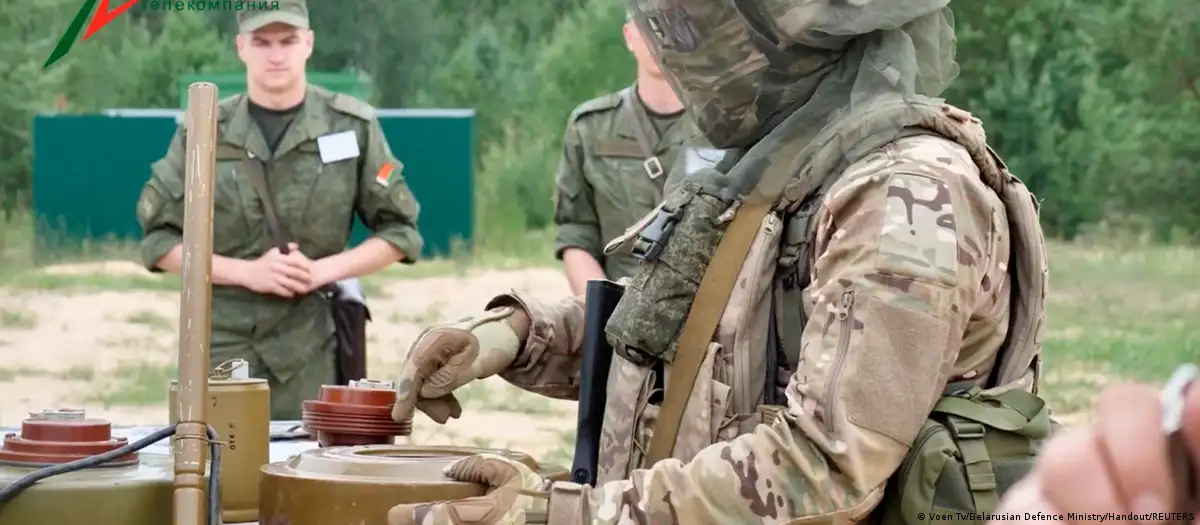After the alleged death of Yevgeny Prigozhin, the future of the Russian mercenary soldiers exiled after mutiny against Moscow is uncertain. Experts present different scenarios.
(DW) Under what circumstances did the leaders of the Russian mercenary group Wagner, Yevgeny Prigozhin and Dmitry Utkin, allegedly die in a plane crash? Two days later, the reasons for the crash of the aircraft they were on are still unclear.
Although Dmitry Peskov, spokesman for the Russian government, refuted on Friday (25/08) any speculation about an order from the Kremlin, few believe that the plane crash that killed 10 people was a mere accident. Just as mysterious as the circumstances is the fate of the mercenary soldiers, including those in Belarus.
For Minsk, a close ally of Moscow, the question now is what to do with the fighters exiled to the country after the failed mutiny against the Russian army leadership at the end of June.
Some 4,000 to 5,000 armed soldiers, notorious for their brutal style of warfare, were sent to Belarus with the status of “instructors”. The question of what will happen to them is not unanimous among experts.
A small part could remain in Belarus…
For Alexander Friedman, a historian in the field of Eastern Europe at the University of Düsseldorf, the career of Prigozhin’s private army has come to an end.
“However, Wagner’s fighters should remain in Africa or Belarus,” he said. For him, the group will continue “perhaps under the same name. But it will report to the Russian Defense Ministry”.
“The ruler of Belarus, Alexander Lukashenko, could keep some of the fighters and integrate them into his power structures,” says Friedman.
“He would have enough money for up to 3,000 fighters, but Moscow has the final say.”
A complete withdrawal of Wagner troops from Belarus is not in Russia’s interest. This would lead to de-escalation on the borders with Poland and Lithuania, where Wagner mercenaries are stationed and are seen as a threat in neighboring European Union (EU) member states. Friedman believes that a large part of the Wagner troops will be sent to Russia or Africa.
Aleksander Klaskovsky, an analyst with the Belarusian independent media project Posirk, sees the situation differently. For him, Lukashenko has no interest in the Wagner members remaining in Belarus.
The mercenaries have no leadership, and the group’s fate as a strong fighting unit with political ambitions is open to question. Both Russian President Vladimir Putin and Lukashenko are interested in weakening the Wagner Group.
Also because the EU and NATO could close the border with Belarus. The fact that relations with neighboring European countries have deteriorated dramatically is “unfavorable” for Lukashenko, according to Klaskovsky. The Belarusian ruler will therefore try to get rid of Wagner.

…to provoke the EU
“Nothing good awaits Wagner,” predicts Valeriy Sakhashchik, a supporter of exiled Belarusian opposition politician and former presidential candidate Svetlana Tikhanovskaya.
He also believes that some of the mercenaries could remain in Belarus, “because Russia has an interest in provocations on the EU border and acts of sabotage in Ukraine”. However, the financial issue is probably the most important.
“Exile” to Belarus was only a temporary solution to “the Wagner problem of the Russian leadership”, according to Grigory Nizhnikov of the Finnish Institute of International Relations.
“There is no tactical or strategic goal to keeping them in Belarus,” he says.
“Lukashenko has no way of leading the troops in Prigozhin’s place and is not making any effort to do so,” said Nizhnikov. His prediction: the Wagner team will leave Belarus by the end of the year.
Aleksander Klaskovsky is also convinced of this: “These people have opposed Putin before. He doesn’t trust them. Therefore, they would almost certainly be divided: “some will return to civilian life, others will go to Africa,” he says.
